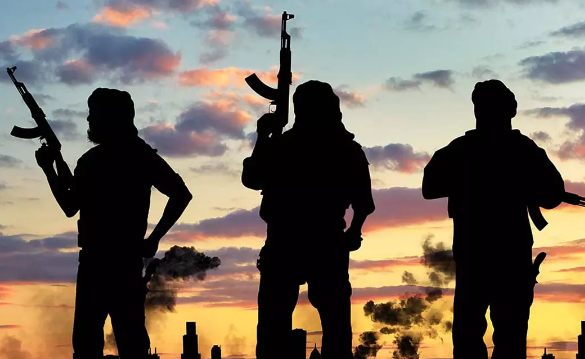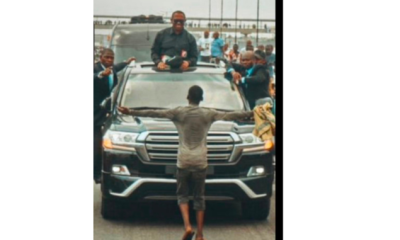News
VIDEO: Journalist narrates escape from kidnappers in military uniform in Kogi

A journalist, name withheld, has narrated his narrow escape alongside passengers as kidnappers kitted in military uniform attacked their passenger bus in Kogi.
In his narrative entitied: ‘THE JOURNEY I WILL NEVER FORGET IN A HURRY DECEMBER 30th 2024’ .
Read him:
“Join me to thank God Almighty
When grace is upon you, all other protocols bow.
“I got a call that my younger brother got a very terrible accident on a bike to bike that got him several injuries, so I rushed to the village to meet them in the hospital with my mum, after spending some days with them in the hospital, after they were discharged from the hospital, I decided to come back to Abuja since the stitches have been done successfully, I boarded a GUO motors back to Abuja.
On our way back along that okene bypass heavily armed bandits “kidnappers” in army uniform attacked us as they were stoping us I noticed this men had cutlasses and AK-47 with them.
“I immediately told drivers not to stop they’re kidnappers, as the driver noticed same he refused to stop they opened fire on him, Oh My God they sprayed our bus with bullets, but still the driver refused to stop, as they tried to kill the driver became impossible, they started firing on the bus tires, that is where the bus lose form, it can’t run again when both tires became flat, with little distance the bus refused to move any further, all the passengers flee into the bush as they chased the bus.
“But thank God Almighty that is not that kind of passenger bus that the driver had to turn round to open the passengers door, no one was captured among us.
” Both women and children, the driver including me were rescued yesterday(Monday ) by God. Before the army now came to start firing guns to the air to completely chase them away from the scene.
” The issue is we just passed the army checkpoint not less than 2mins to another army checkpoint, the distance from another army checkpoint is not far, so who are these bandits and kidnappers???
“Please my friends and colleagues join me to thank the God I serve, is a living God. We will not end this year in pain, as we cross over God Almighty will continue to protect you and your family.
” We will all see 2025. Assuming the driver stopped or they kill him, by now it could’ve been a different story now. I celebrate you in Jesus name
See video of rescue team and bullet ridden bus below:
News
Scores killed as NAF fighter jet bombs insurgents’ stronghold in Sambisa forest

The Nigerian Air Force on Thursday announced that two coordinated airstrikes had successfully neutralised several terrorists and destroyed their hideouts in Borno State.
The precision strikes, carried out under the Air Component of Operation Hadin Kai, targeted known insurgent enclaves in Kollaram and Arra—two areas identified as long-standing terrorist strongholds within the Sambisa general area and the Southern Tumbuns.
According to a statement released by the Director of Public Relations and Information at NAF Headquarters, Air Commodore Edward Gabkwet, the first operation was conducted at approximately 5:30 a.m. in Kollaram, following credible intelligence and surveillance footage that confirmed the presence of high-value terrorist commanders and operational facilities.
“In a bold display of force and precision, the Nigerian Air Force, under Operation Hadin Kai, executed two highly successful air interdiction missions on April 15, 2025, targeting terrorist strongholds in Borno State’s Sambisa general area and the Southern Tumbuns,” the statement read.
“The first strike occurred at approximately 5:30 a.m. in Kollaram, a known insurgent hub. Intelligence reports, corroborated by surveillance footage, confirmed the presence of high-value terrorist commanders and several operational structures, including those equipped with solar panels. NAF assets executed a precision strike, eliminating numerous fighters and disabling key infrastructure.”
Later in the day, at about 3:55 p.m., another strike was carried out in Arra, also within the Sambisa axis.
According to Ejodame, real-time visuals obtained from Intelligence, Surveillance, and Reconnaissance missions revealed clusters of armed militants actively operating in the area.
“Precision-guided munitions were employed during the mission, resulting in the effective destruction of identified targets and significant disruption of the group’s operational capabilities,” he added.
Ejodame emphasised that the airstrikes form part of an ongoing and intensified aerial campaign aimed at degrading terrorist capabilities, dismantling leadership structures, and eliminating insurgent sanctuaries across the region.
Meanwhile, the Defence Headquarters said on Thursday that troops neutralised a notorious terrorist kingpin, Bello Kaura, in a precision airstrike conducted by troops of Operation Fasan Yamma.
Kaura was among the scores of terrorists neutralised by troops between April 10 and 16, 2025, according to the DHQ.
A statement by the Director, Defence Media Operations, Maj. Gen. Markus Kangye, said troops, in collaboration with other security agencies and hybrid forces, carried out a series of coordinated operations in Zamfara, Sokoto, Kaduna, Niger, Kwara States, and the FCT among others.
These operations, he said, were marked by fierce engagements with terrorists, leading to the killing of several insurgents, arrests of suspects, and recovery of a cache of arms and ammunition.
“Between 10 and 16 April 2025, troops conducted fighting patrols and made contact with terrorists in Anka, Tsafe, Talata Mafara, Kaura Namoda and Maru LGAs of Zamfara State as well as Gudu, Isa and Tangaza LGAs of Sokoto State. They conducted operations in Giwa, Chikun and Birnin Gwari LGAs of Kaduna State as well as Bida LGA of Niger State.
“During the encounters, many terrorists were neutralised, including an identified terrorist kingpin, Bello Kaura, in an air interdiction, arrested some of them, while 17 kidnapped victims were rescued,” he said.
He also said troops thwarted oil theft worth over ₦262.7m and arrested suspects.
“During the week under review, Operation DELTA SAFE foiled oil theft worth over N262,702,150.00 only.
“The breakdown indicates: 117,395 litres of stolen crude oil, 22,050 litres of illegally refined AGO, 6,000 litres of DPK and 8,060 litres of PMS. Additionally, they discovered and destroyed 102 crude oil cooking ovens, 94 dugout pits, 18 boats, four speedboats, 56 storage tanks, 164 drums and 42 illegal refining sites. Other items recovered include pumping machines, drilling machines, galvanised pipes, tricycles, motorcycles, mobile phones and nine vehicles,” he said.
Kangye assured the citizens of the Armed Forces’ commitment to protecting national sovereignty and ensuring the safety of all law-abiding citizens.
He said to deny the criminals freedom, the military would take the battle to them.
“We are taking the battle to the enemy to deny them freedom of action, making them thirst for surrender.
“I wish to reiterate the untiring commitment of the Armed Forces of Nigeria to dominate and act in defence of our nation’s sovereignty while guaranteeing the protection of all law-abiding citizens to promote the betterment of our society.
“Our operations across all theatres remain focused, intelligence-driven, and in line with the highest standards of professionalism and respect for human rights,” Kangye added.
He called on the civil populace to continue supporting military operations.
Kangye said, “We once again appeal that the civil populace trust us and see us as friends and partners working for the general good and well-being of the nation. We recognise the sacrifices made daily by our gallant troops, and we salute their courage and dedication.”
News
NANS threatens protest over alleged student loan diversion

The leadership of the National Association of Nigerian Students has called for a probe into the alleged diversion of students’ loans by some tertiary institutions.
The body threatened to embark on a mass protest to demand action against culpable institutions on April 24.
It also urged President Bola Tinubu to set up a monitoring team to ensure the funds reached targeted beneficiaries.
The NANS National Vice President, Inter-Campus and Gender Affairs, Comrade Felicia Akinbodunse, stated this during a briefing in Abeokuta on Thursday.
“On the part of NANS, the National President of the student body has put the zonal leadership of the association on standby to mobilise against schools discovered to be involved in the graft.
“April 24 has been chosen by NANS to organise mass protests across all the zones, to call the attention of President Bola Tinubu to the clandestine moves by some people to divert funds meant for the student loans into their private accounts,” she said.
Akinbodunse said it was regrettable that the Nigerian Education Loan Fund, a key initiative of the current administration designed to make higher education accessible to all, was being undermined by the corrupt practices of some tertiary institutions.
“We call on President Bola Tinubu to set up a monitoring system to ensure that the funds meant for the student loans get to the targeted beneficiaries.
“As the President’s baby, NELFUND must not be allowed to be rubbished by officials in charge of loan disbursement in higher institutions.
“Mr President must not hesitate to wield the big stick on any higher institution found tampering with loans meant to help the students,” she said.
Akinbodunse said it was saddening that recent investigations by the National Orientation Agency into the disbursement of student loans revealed that the scheme was being tampered with by officials responsible for distributing the funds to eligible students.
The student body said members would not sit by and watch idly as some corrupt bank officials colluded with tertiary institutions to make a mess of their future.
The association also called on the Economic and Financial Crimes Commission and the Independent Corrupt Practices and Other Related Offences Commission to launch a comprehensive probe into the alleged sharp practices to bring culpable schools to justice.
“Furthermore, the Economic and Financial Crimes Commission and the Independent Corrupt Practices Commission and other Related Offences Commission should be directed to beam their searchlights on institutions suspected of corrupt practices.
“Also, banks found to be conniving with officials of higher institutions to shortchange students should be adequately sanctioned to serve as a deterrent to others.
“Meanwhile, we want to urge the NOA and NELFUND to disclose the identity of individuals or higher institutions dipping their hands into loans meant for the students.
“Also, the identity of the banks conniving with these identified officials should also be exposed,” the NANS official stated.
News
David Mark Raises Alarm: ‘Deliberate Attacks Focused on Annihilating Benue Communities’

Former Senate President, David Mark, has condemned in strong terms, the recent attacks in Otukpo and Ado Local Government Areas of Benue State, which left at least 15 people dead on Tuesday night.
The assaults occurred in the communities of Otobi-Akpa and Emichi in Otukpo LGA, as well as Utonkon in Ado LGA, where gunmen unleashed violence on residents.
In a statement released by his Special Adviser, Paul Mumeh, Mark described the killings as “one too many” and called on security agencies to urgently rise to the occasion.
“This is no longer a random occurrence,” Mark said. “It appears to be an organised, premeditated onslaught. We cannot continue to sit back and watch our people slaughtered for no reason.”
He stressed the need for communities to form vigilance groups to defend themselves and their property, noting that the security situation in parts of Benue requires immediate and serious attention.
While encouraging Benue people to remain accommodating, he urged them to be cautious and able to distinguish between genuine residents and hostile intruders.
“Inasmuch as we should welcome others, we must differentiate between legitimate residents and those with harmful intentions,” he added.
Mark extended condolences to the families of the victims and prayed for the souls of the departed. He also urged residents to stay calm and cooperate with security forces working to restore peace.
This statement follows a similar warning he issued on April 7, where he cautioned against reprisals after a wave of attacks by suspected terrorists in the state.
-

 News16 hours ago
News16 hours agoBREAKING: Unknown gunmen reportedly storm Senator Natasha’s family residence
-

 News19 hours ago
News19 hours agoSnub story on removal of Rivers Sole Administrator, it’s FAKE-Chief Registrar
-

 News18 hours ago
News18 hours agoSAD! Again, Alleged Herdsmen Attack Three Benue Communities
-

 News10 hours ago
News10 hours agoAbuja light rail project must be commissioned on May 29-Wike vows
-

 Politics18 hours ago
Politics18 hours agoPDP govs are jokers, can’t stop coalition train, Atiku boasts
-

 News15 hours ago
News15 hours agoLawmaker Slams NBA Over Rivers Crisis, Demands Return of N300m
-

 News14 hours ago
News14 hours agoFinally , Lagos Court frees Quadri, young Nigerian who stood before Obi’s convoy in viral photo
-

 News11 hours ago
News11 hours agoSEYI Tinubu Speaks On Alleged Abduction, Brutalization Of NANS President Atiku Abubakar Isah




















